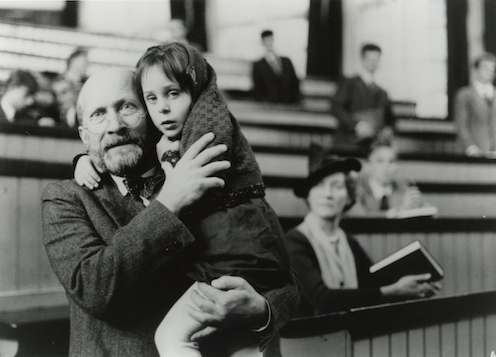Korczak

Full Description
"Great lives are just like legends - difficult but beautiful," wrote Janusz Korczak. On August 6, 1942, Korczak, the famous physician, writer and teacher became a legend. On that day, the SS forced him to gather together 200 orphaned children under his care in the Warsaw Ghetto. Korczak had fought for several years to protect them and give them hope. He made no attempt to save his own life, although he could have escaped through his connections with influential people. Korczak led his children, who proudly carried a banner with the Star of David, quietly and calmly to the train that took them to Treblinka. Scripted by Agnieszka Holland (Andrzej Wajda's protegé and the director of EUROPA, EUROPA), KORCZAK is a tribute to one heroic Polish Jew who maintained incredible dignity and humanity in the face of unspeakable events.
Filmmaker Bio(s)
Andrzej Wajda was born on March 6, 1926 at Suwalki, in the North East of Poland. Before the war, Suwalki was a garrison town and Wajda's father was a cavalry officer. Family snap shots often feature young Andrzej and his brother, both of them jokingly wearing shako hats.
At the onset of the war, Wajda's father was called to the German border. He was never to return. Wajda had to interrupt his studies and find various jobs for a living. He worked as a locksmith's apprentice, and took care of the illuminating of the local church in his spare time.
In 1942, he joined the A.K., i.e. The Home Army, which was commanded by the Polish Government in exile in London:"My function," he explains, "Was that of a liaison officer."
He resumed his studies after the war:"In 1946, I became a first-year student, at the Academy of Fine Arts in Cracow." He didn't stay long:"One thing I knew for sure: I had done poorly at the Academy."
So it was "quite by accident" that he enrolled at the National Film School in Lodz in 1949. "The years spent in the school were hell for me. I felt I was wasting my time. Years later I learnt that I had studied at the best film school in the world."
However, Wajda admits that the Lodz school gave him "the invaluable opportunity of a practical encounter with film." Having directed three shorts, he graduated in 1953 and became assistant to director Akeksander Ford (who once had a Korczak project too).
Wajda directed his first feature, A Generation, in 1954. "It was certainly my greatest film adventure. On the screen, however, A Gerneration was major disappointment to me. It could have been a much more beautiful, a richer film. I came to the conclusion I should not make any more films."
This is the kind of decision that explains why Wajda once declared:"The greatest difficulties I have are with myself." Fortunately, he did not stick to his conclusion and has since directed about thirty films, among which Ashes and Diamonds, Siberian Lady Macbeth, Landscape After the Battle, The Wedding, Land of Promis, Rough Treatment, and The Conductor and Danton.
One reason Wajda did not like the Lodz school was that film was taught there as a much too literary medium, but one should not forget he is as much a stage director as a film director. "I am often asked why I bother myself with the theater, whose works disappear with time and are so easily forgotten, since I can make films which last forever, always having a chance to move and entertain future generations. It is precisely this ephemeral and transitory nature that turly and profoundly binds me to the theater, for it is not only the need of immortality and the wish to live on that constitute the nature human need - it is also the awreness of nothingness and death that attracts us, and with age even more so."
Elected chairman of Film Unit X - a production branch of Film Polski meant to encourage young filmmakers - 1972, and President of the Polish Filmmakers Union in 1979, Wajda had to resign these two functions in 1981 because of the political situation in Poland. In 1989, after directing several films outside Poland, he was elected Senator of the Polish People's Republic. He is said to have declared that, because of his political responsabilities, and because of his fatigue, Korczak would be his last film.
Director(s)
Country(ies)
Language(s)
w/English Subtitle
Release Year
Festival Year(s)
Running Time
113
